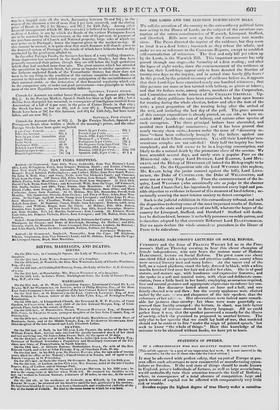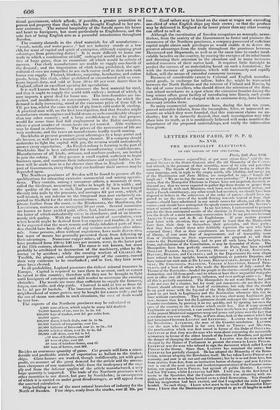STATISTICS OF SWEDEN.
BY A CORRESPONDENT WHO HAS RECENTLY VISITED rne COUNTRY.
[This article appeare in a part of our impression last week. It is now inserted in the remainder. Mr the use of those who take the latest ethtiou I IT may be advanced with perfect safety, that no part of Europe at pre- sent offers snub advantages to new commercial or manufacturing specu- lations as Sweden. If the real state of things should he made known in England, priva.e individuals of fortune, as well as large associations, would undoubtedly turn their attention towards the Gulf of Bothnia ; where, in consequence of a total absence of competition, large and quick returns of capital can be effected with comparatively very little risk or trouble.
Sweden enjoys the highest degree of true liberty under a caustics. tional government, which affords, if possible, a greater protection to person and property than that which has brought England to her pre- sent eminence. 'I he natural hospitality of the Swede opens his house and heart to foreigners, but more particularly to Englishmen, and the sole fact of being English acts as a powerful introduction throughout Sweden.
The country abounds in the chief materials for all manufacture-
" woods, metals, and water-power ;" but yet industry stands at a low ebb, for want of capital and spirit of enterprise, although enjoying great advantages from protecting duties ! It is more difficult to name one trade in which a combination ofskill: andeapital would not be produc- tive of large gains, than to enumerate all which would be certain of success. Our cloth manufactures are unable to supply one-fourth of the demand ; and the importation of cloth being prohibited, the agri- cultural dosses are compelled to use such coarse stuff as their own rude looms can supply. Flannel, blankets, carpeting, bombazine, and cotton
goods, being, like cloth, either prohibited or encumbered with an enor. mous import-duty, and sold at from 50 to 60 per cent. dearer than in .England, afford an excellent opening for speculation.
It is well known that Sweden possesses the best material for steel, and that it ought to supply the world with cutlery ; instead of which, it now imports a great deal for home use. The iron-foundries are im- perfect and insufficient ; in consequence, iron castings, for which the demand is daily increasing, stand at the enormous price of from 12L to 17/. per ton, whilst the same weight of pig ironic sold under 3/. sterling. A practical man will, on the first investigation, find that Sweden might m anti firet ure steam-engines and build steam-vessels considerably cheaper than any other country ; and a large establishment for that purpose would for some time find full employment in the Baltic navigation, where a great number of steam-boats are yet wanted. Able workmen may be found in abundance. The prices of the necessaries of life are very moderate, and the taxes on manufactures hardly worth naming.
Stockholm at present promises great advantages to a large porter and ale brewer, as well as to a manufacturing chemist. If a company should undertake to light the capital with gas, the returns would undoubtedly answer every expectation. An English colony is forming in the part of Stockholm that is best calculated for manuflicturing establishments. Manufacturers of all kinds, artisans, and machine-makers, are invited to join the colony. If they possess a small capital, sufficient to begin business upon, and continue their industrious and regular habits, a for- tune will be made here in a far shorter time than in England. On the part of Government, every thing that can facilitate their success may be depended upon.
The Northern provinces of Sweden will be found to possess all the qualifications for attracting extensive commercial and mining specula- tions. They contain, amongst numerous others, a mountain of iron, called the Geslivari, measuring 41 miles in length by 3 in width ; and the quality of the ore is such, that portions of it have been forged directly into nails by the peasants, and averages 63 per cent., which, if well treated, is not inferior to the Oregrund iron now exclusively ex- ported to Sheffield for the steel manufactures. Other masses of iron situate further from the coast, as the Rirukowara, the Handiwara, the Luuzziwara, contain an ore averaging 70 per cent. Several mountains are known to have yielded gold, silver, lead, loadstone, and copper,— the latter of which undoubtedly exists in abundance, and of an uncom- monly rich quality. With the very limited spirit of speculation, even when benefit might be derived from less expense and trouble, it is not to be expected that the most remote and thinly-inhabited parts of Swe- den should have been the objects of any serious researches after mine- rals. Some persons, often without experience, have mode discossries, but want of means has generally prevented them from following up their advantages. Numerous copper mines, of which one is known to have produced from 100 to 130 tons per annum, were, in the latter part of the 17th century, abandoned. The cause is not known, but must probably be attributed to destruction of the machinery, either by the enemy or by accident ; while the ensuing warfare of CHARLES the Twelfth, the plague, and subsequent poverty of the country, caused their very existence to be overlooked ; and in fact, they have never since heed cleared.
In all probability, Lapland possesses the richest mineral treasures in Europe. Capital is required to turn them to account, such as cannot be raised in this country ; therefore will they not be brought to light until foreigners of enterprise and skill resolve to overcome the existing obstacles. The woods are more than sufficient to supply the furnaces, forges, saw-mills, and ship-yards. Charcoal is sold as low as from tad. to Is. 4d. per 48 bushels. The immense forests, which arc not in the neighbourhood of water-power, may be bought for a mere trifle ; and by the use of steam saw-mills in such situations, the cm A of deals would be very low.
The exports of the Northern provinces may be calculated at
4,000 tons of iron, which might be many fold doubled.
70,000 barrels of tar, cost 5s. to 5s. 6d. 100,000 logs of timber, cost 2d. per cubic foot. 50,0110 spars. 100,000 dozen 3-inch deals, cost 4s. to 8s. 60,000 barrels of turpentine, cost 15s. 50,000 fathoms of firewood, cost 2s. to 3s.. 6d 20,000 reindeer skins, cost 2s. to 4s. 6d. 30,000 calf. skins, cost tkl. to 84.
.t.0 tons of feathers, cost 50/ 50 tons of glue, cost 25/. 40 tuns of reindeer-horns, cost 8/.
100 tons of hotter, cost 30/.
Besides an enormous quantity of game. Cut granite will form a consi- derable and profitable article of exportation as ballast to the timber- ships. Glass-houses are worked, though indifferently, yet with good profit, on account of the great demand for the article and the uncom- mon cheapness of raw materials, while from the inadequacy of the sup- ply and from the inferior quality of the article manufactured, a very large quantity is imported. The trade of the Northern provinces with other countries is not direct, but goes by Stockholm ; in consequence of which it is carried on under great disadvantages, as will appear from the annexed calculation. Ship-building is one of the most natural branches of industry for the North of Sweden. Fine ships, ready from the stocks, cost 2/. 10s. per ton. Good sailors may be hired on the coast at wages not exceeding one-third of what English ships pay their crews ; so that the produce may be delivered in England at far lower prices than any other country can afford to sell at.
Although the constitution of Sweden recognizes no monoply, never- theless, from the anxiety of the Government to foster and promote the
commerce of the Northern provinces, a company possessed of sufficient capital might obtain such privileges as would enable it to derive the greatest advantages from the trade throughout the provinces between Hernosand and Haparanda, as well as at the same time to confer incal- culable benefits on the country, by rousing the energies of its inhabitants and directing their attention to the abundant and in niany instances untried resources of their native land. It requires little foresight to predict the success of an undertaking based on such a foundation ; for with the increase of population, which will necessarily and rapidly follow, will the means of extended commerce increase.
Business of considerable extent in Colonial and English manages tured goods, in exchange for tallow, hides &v. might be transacted between the North Bothnia and the interior of Finland and Russia, by the aid of some travellers, who should direct the attention of the Rus- sian inland merchants to a spot where the extensive frontier dining the long winter offers great facility of introducing into Russia such goods as, although prohibited or charged with an enormous duty, have become necessary articles there.
So many commercial speculations have, during the last ten years, proved miserable failures, from the incomplete, false, or interested ac- counts on which they were founded, that this statement claims no au- thority; but it is earnestly desired, that such investigation may take place into its truth, as it is confidently believed will make manifest the importance of the proposed undertakings, and verify the information here given.























 Previous page
Previous page